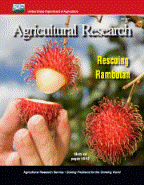United States Department of Agriculture: Agricultural Research Service, Lincoln, Nebraska

Agricultural Research Magazine
Date of this Version
2-2013
Document Type
Article
Citation
Agricultural Research February 2013.
Abstract
More than 100 years ago, the Japanese government presented flowering cherry trees as a gift to the U.S. government. Those wonderful living gifts have blossomed along the National Mall’s Tidal Basin, as well as at other locations around Washington, D.C., since then.
In April 2012, Secretary of State Hillary Clinton announced a gift of 3,000 flowering dogwood trees to Japan to commemorate the 100th anniversary of Japan’s gift of cherry trees to the United States.
The job of finding the right dogwoods belongs to scientists at the U.S. National Arboretum, in Washington, D.C. Agricultural Research Service plant geneticist Richard Olsen has worked to determine the appropriate dogwood cultivars for the varied Japanese climate and to locate the planting material.
“There are many things to consider, including temperature range and insect pests to which particular dogwood candidates may be susceptible,” says Olsen.
The planning group—which includes the U.S. Department of State; the U.S. Department of Agriculture’s Animal and Plant Health Inspection Service, Forest Service, and ARS; and the U.S./Japan Bridging Foundation, a nonprofit organization—sent the first batch of 150 trees to Japan, and they were planted in Tokyo in November 2012. Altogether, a total of 1,000 will be planted in Tokyo, 1,000 in the Tohoku region in honor of the tsunami victims, and the final 1,000 will be distributed to schools and other organizations throughout the country.
“We are evaluating the performance of dogwood germplasm at the arboretum as well as novel cultivars available in the American nursery industry to find those most suited to the Japanese clime,” says Olsen. The arboretum has, for decades, collected dogwood germplasm from across the United States—it is found from Florida to Michigan and as far west as Missouri and Texas.
Included in
Agriculture Commons, Animal Sciences Commons, Food Science Commons, Plant Sciences Commons

